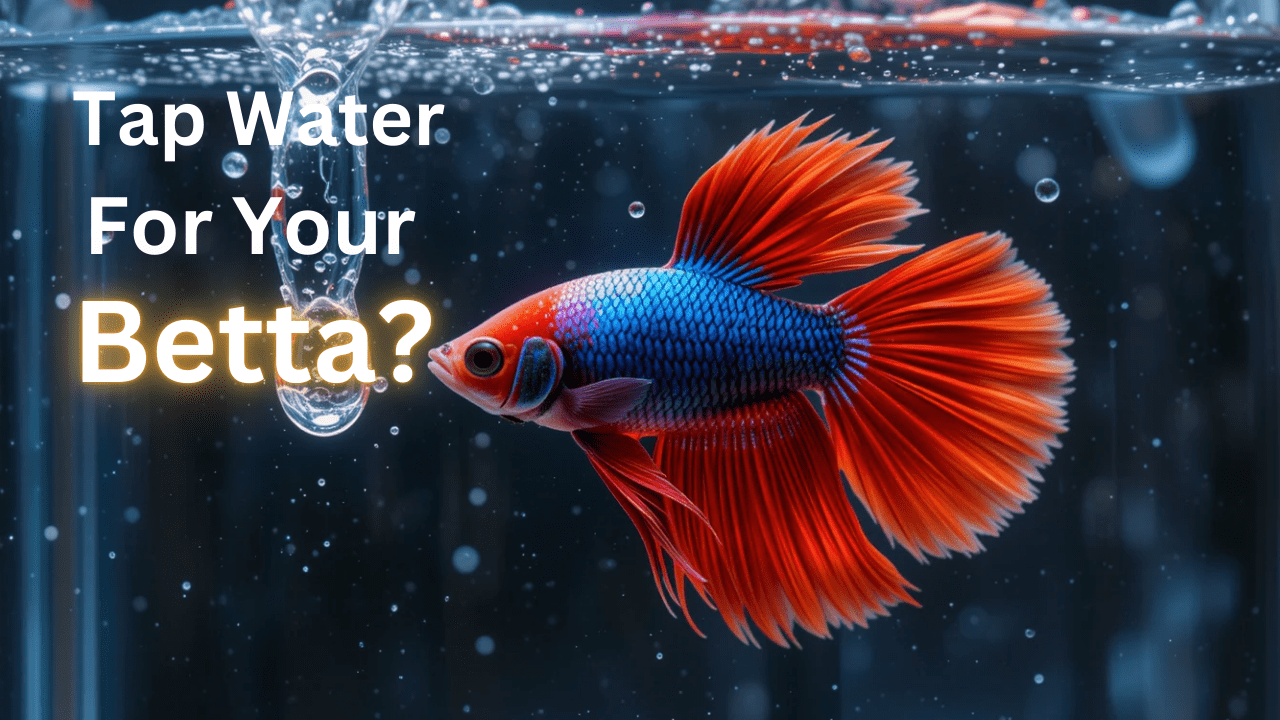When I first got a Betta, I was amazed by how colorful, vibrant, and interesting these fish are. They quickly became my favorite because of their beauty and the ease of care they require.
As a beginner in this hobby, I realized that proper guidance is essential, especially in the initial stages of caretaking. One of the most common questions that often gets asked is whether tap water is safe for them. It might seem easy to prepare tap water and set up a Betta aquarium, but is it actually healthy for your Bettas?

This article will explore this question and provide all the information you need about ensuring your Betta thrives in the right water conditions.
Is Tap Water Safe for Betta Fish?
The short answer is yes, but there’s more to it. While Betta fish can live in tap water, it must be appropriately treated to keep them healthy. Untreated water contains many minerals and chemicals that can negatively affect the quality, such as copper, lead, and nitrate. These toxins and contaminants must be removed to create a safe environment. Some people think that because Bettas can breathe surface air and survive without a filter, they can thrive in any water. But this isn’t true. They belong to a subfamily of fish called anabantoids, also known as labyrinth fishes. Their labyrinth organ allows them to get oxygen directly from the air, helping them withstand poor conditions for short periods. However, for an extended period, the water must be treated.
If you want to use tap water, you need to treat or condition it first. Conditioning involves removing chlorine, chloramines, and other contaminants. This can be done through manual methods or by adding a conditioner to render other chemicals harmless. Once the tap water is treated, it can be used to fill a fish tank and maintain a safe home for your Betta. It’s important to make sure you treat your water every time you do a change, as this is essential for Betta health.
Is It Safe to Leave Betta Fish in Tap Water Overnight?
It is not recommended to leave your Betta fish in tap water overnight, except in rare emergency situations. Such emergencies may include a tank breaking all of a sudden or someone suddenly dropping off a fish at your place without prior announcement. In both cases, you may not have the necessary supplies on hand, such as a water conditioner. If you can avoid it, though, it’s best to not expose your fish to untreated tap water. While it’s true that Bettas can typically survive 24 hours in poor conditions, it’s still not good practice.
Plus, Bettas are sensitive creatures and can become ill if exposed to contaminated water, which tap water often contains. To be sure, it is always better to avoid leaving them in untreated water and instead use conditioned or treated water to keep them safe.
How Long Can Betta Fish Stay in Tap Water?
Betta fish can’t tolerate untreated tap water for a long period, and in fact, it’s not recommended to leave them at all in such conditions. The chemicals in tap water might not kill them immediately, but they can damage the body as soon as it comes into contact with the water. To make it suitable to live in, the water needs to be conditioned with an aquarium conditioner before use to remove harmful contaminants. However, if you want your Betta to stay in tap water for long periods, just conditioning isn’t enough. You also need to implement a regular change schedule to ensure they have clean, fresh water at all times.
This is because, besides contaminants, your Betta, along with other tankmates like shrimps or snails, will produce waste that pollutes the water over time. It might seem like a lot of work, but with proper care and maintenance, your Betta can still enjoy a healthy life in the tank, even if you’re using tap water.
What Does Tap Water Do to Betta Fish?
Tap water is dangerous for Betta fish if left untreated. It often contains chlorine, a chemical used to purify water for humans but toxic for fish. While the amount of chlorine in drinking water is safe for people, it can trigger serious reactions in Betta fish, leading to life-threatening consequences. Hypoxia occurs when chlorine reduces dissolved oxygen levels, making it hard for Bettas to breathe. Their gill tissue can become inflamed, leading to necrosis, a condition where the gills deteriorate, causing infection and ultimately death. In severe cases, chlorine poisoning can kill Bettas within minutes, making tap water lethal unless properly treated.
Using tap water is the most convenient option for setting up a Betta fish tank, but treating it properly is essential. When filling a tank for the first time, the easiest solution is to turn on the faucet, but the water needs to be prepared correctly to make it safe for your Betta.
Steps to Make Tap Water Safe for Betta Fish
- Test the water first. Before treating, use a water testing kit to check for contaminants such as pH, chlorine, ammonia, nitrites, and nitrates. A reliable option like the API Freshwater Master Test Kit ensures you know what needs to be removed.
- Remove chlorine and chemicals. Tap water contains chlorine and other harmful substances that must be eliminated. The easiest way is to use a water conditioner, but if that’s not available, there are alternative dechlorination methods we’ll discuss later.
- Let it sit before use. After dechlorinating, allow the water to sit for at least an hour or up to 24 hours to help any remaining chlorine dissipate. If you’re using a conditioner, waiting a few minutes is often enough, but giving it time ensures optimal conditions.
- Regulate the temperature. Since Betta fish are tropical, they thrive in temperatures between 76-82°F (24-28°C). If necessary, use a heater and monitor it with an aquarium thermometer to maintain the right range.
- Balance water chemistry. Some areas have hard tap water, exceeding 300 ppm or 20 DH, which may require adjustments. Adding driftwood or Indian almond leaves can release tannins to help soften the water naturally.
- Final water check. Before introducing your Betta, test the water parameters again to confirm they’re in a safe range. If using a new tank, let it cycle properly for the best water quality.
Top Water Conditioners for Betta Fish Tanks
Choosing the right water conditioner is essential for making tap water safe for your Betta fish, but with so many options, it can be overwhelming. Below are some of the best conditioners to ensure a healthy environment for your Betta.
- Seachem Prime Fresh and Saltwater Conditioner – A highly trusted brand in the aquarium hobby, Seachem Prime is known for its quality and effectiveness in neutralizing harmful chemicals.
- API Tap Water Conditioner – One of the highest-rated options, this classic product is widely used among fish keepers and has a strong reputation for keeping tap water safe.
- Fritz Complete Water Conditioner – A cost-effective and high-quality solution that effectively treats tap water, making it a reliable option for Betta owners.
Alternative Ways to Treat Tap Water Without a Conditioner
If you don’t have access to a water conditioner, there are still ways to make tap water safer for your Betta fish. While these methods can help, they may not remove all harmful chemicals, so proceed with caution.
Aged Water
One option is to use aged water, which involves filling the tank with tap water and letting it sit for at least 24 hours. This allows chlorine to evaporate, making the water less toxic. However, this method only works if chlorine is the only issue. If the water contains chloramine, ammonia, or copper, it remains unsafe for your Betta.
Ultraviolet (UV) Light
Chlorine breaks down when exposed to ultraviolet light, which is why outdoor swimming pools require frequent chlorine treatments. In aquariums, a UV sterilizer can be used to neutralize chlorine by passing tap water through it for a few minutes before adding it to the tank. However, like aged water, this method is not completely effective. It won’t remove all harmful substances, and it cannot eliminate chloramine, which is even more toxic to Betta fish.
Vitamin C
A lesser-known method involves using Vitamin C to neutralize chlorine. It can break down chlorine molecules, making the water safer for Betta fish. However, this method is extremely tricky since it requires a precise and minuscule amount—less than 1/1000 of an ounce. Even a small miscalculation can result in a lethal overdose that could harm or kill your Betta.
Activated Carbon
Chlorine binds to activated carbon, which can be used as a filtration method to decontaminate tap water. Adding activated carbon to a filter allows it to absorb chlorine, creating a safer environment for Betta fish. However, this method takes too long to be practical in an emergency and is better suited for maintaining an already established tank.
Reverse Osmosis (RO)
Reverse Osmosis (RO) is a highly effective process that removes impurities from tap water, making it as close to Betta-safe as possible. It eliminates almost all harmful substances, ensuring the best water quality. However, RO systems are expensive and require regular maintenance. While it’s not the most budget-friendly option, it is an excellent long-term investment for those who prioritize Betta fish health.
FAQs
Is Tap Water Safe for Betta Fish?
Bettas are freshwater fish and can live in tap water, but it must be treated first to ensure their safety. Untreated tap water contains chlorine, chloramine, and other harmful chemicals that can negatively impact their health. To make it safe, always use a water conditioner or other treatment methods before adding it to their tank.
Which Water is Best for Betta Fish?
The best water for Betta fish is clean, dechlorinated water with a temperature of 78 to 80°F (25 to 27°C). Treated tap water is a great option when using a water conditioner to remove chlorine and harmful chemicals. Alternatively, you can use specially formulated Betta water, which is pre-conditioned and safe for immediate use in a Betta tank.
Can Betta Fish Live in Hard Water?
Bettas prefer softer water with a neutral or slightly acidic pH for optimal health. While they can adapt to hard water, it may cause stress over time. If your tap water is too hard, using driftwood or Indian almond leaves can help lower water hardness naturally and create a more comfortable environment for your Betta.
Can Betta Fish Live in Hard Water?
Bettas prefer softer water with a neutral or slightly acidic pH for optimal health. While they can adapt to hard water, it may cause stress over time. If your tap water is too hard, using driftwood or Indian almond leaves can help lower water hardness naturally and create a more comfortable environment for your Betta.
Conclusion
Bettas are hardy fish that can adapt to different conditions, but chlorinated water is dangerous for them. If you plan to use tap water, it is essential to dechlorinate and remove contaminants completely before adding your Betta. While this process may seem complicated, now that you understand the basics, making tap water Betta-friendly is easy and manageable!
